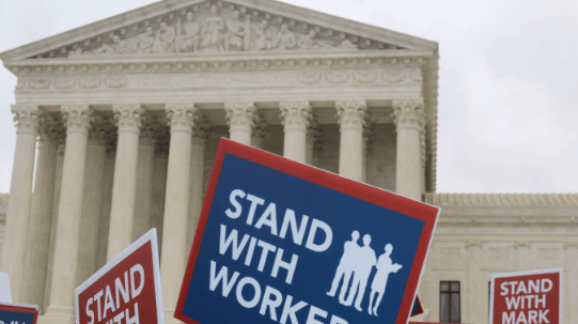Even After Janus, Unions are Still Wrongly Forcing Speech on Public Employees
Despite a Supreme Court ruling last year that forcing public workers to pay union fees as a condition of employment goes against First Amendment free speech rights, public employees are still forced to associate with a union and let the union speak for them, no matter how strongly an employee disagrees with that speech.
Dues or no dues, the vast majority of state laws still deem government unions as “exclusive representatives” that speak on behalf of all employees at a workplace, including nonmembers who have refused to join the union.
That soon may change. The Supreme Court has been asked to review if mandatory exclusive representation by a union violates the First Amendment right of those who declined to join the union. The lawsuit was brought by St. Cloud State University professor Kathleen Uradnik. Under Minnesota law, she is forced to have the Inter Faculty Organization represent her and speak on her behalf. In addition, the law requires state employers to listen to an exclusive representative before determining work terms and conditions. Given the union’s monopoly status, individual employees like Uradnik are prohibited from negotiating directly with their employer and must work under a union-negotiated contract.
The Supreme Court should hear her case because, as the court recognized in last year’s case, Janus v. AFSCME, exclusive representation is “a significant impingement on associational freedoms that would not be tolerated in other contexts.”
Adding insult to injury, the vast majority of public employees who are currently compelled to accept representation from a union were never afforded the opportunity to vote on whether they want a union or on the specific union that would represent them. In the case before the court, the IFO was certified as the exclusive representative for St. Cloud State University faculty in 1975. As such, instead of voluntarily selecting a specific union representative, employees are compelled to accept union representation, as a condition of employment, chosen by past employees.
Certainly Uradnik, whose employment began at the university in 1999, never had the opportunity to vote on whether she desired the IFO’s representation or not. She’s not alone. An examination of the St. Cloud State University’s Faculty and Administration webpage, which allows users to search for professors in each department, found only two professors whose tenure began prior to 1975. This inspection shows less than 1 percent of the faculty had the chance to cast a vote.
Worker choice is particularly consequential because the IFO does a lot of speaking for nonmembers and employees. The IFO, in its capacity as an exclusive representative, speaks out on a variety of political matters. In the run up to the 2018 elections, the IFO made political endorsements in the campaigns for Minnesota governor, lieutenant governor, and attorney general — all Democrats.
On the IFO website, the union touts its “Legislative Advocacy,” which includes working “closely with lawmakers to advance the interests of state university faculty during budget and policy discussions.” Reports submitted to the Minnesota Campaign Finance Board show that the IFO lobbied the legislature and administration on a variety of policy matters: K-12 education policy, higher education policy, pensions, labor relations, human rights, and taxes. All of the IFO’s speech on these topics is attributed to members and nonmembers, without regard for their personal stances on the issues.
It is high time for the Supreme Court to weigh in on the issue of exclusive representation. Workers should not be forced to have a union speak on their behalf or work under a union contract against their will. This is particularly troublesome because most public employees inherit union representation rather than voluntarily select it.
In Janus, the court stated, “Compelling individuals to mouth support for views they find objectionable violates that cardinal constitutional command.” The only way to undo this wrong is to find that union-exclusive representation violates the First Amendment rights of all public employees. Such a ruling is the only way to stop unions from putting words in the mouths of unwilling public workers.
Originally published at the Washington Examiner.
